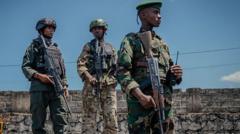Joseph Kabila, the former president of the Democratic Republic of Congo, has returned to the country amidst treason allegations linked to the Rwandan-backed M23 militia. His arrival in Goma challenges ongoing peace negotiations and reunites the former leader with the militia accused of aiding him.**
Tensions Rise as Former Congolese President Enters Goma Amid Treason Allegations**

Tensions Rise as Former Congolese President Enters Goma Amid Treason Allegations**
Joseph Kabila's return to Congo coincides with escalating accusations tied to a rebel militia, intensifying the complex political landscape of the region.**
Former president Joseph Kabila of the Democratic Republic of Congo has made a surprising return to his home country after years of self-imposed exile, igniting a complex political situation in light of recent treason accusations against him. The Senate of Congo accused him of supporting the M23 militia, a group that has made significant territorial gains this year, leading to calls for prosecution. However, Kabila's choice to enter Goma, a city currently controlled by the militia, places him beyond the reach of Congolese authorities.
Goma was seized by M23 in January 2025, a group backed by neighboring Rwanda, which adds another layer to the intricate geopolitical dynamics at play. The return of Kabila, who led the nation for nearly two decades, is noteworthy as the United States aims to broker peace between Rwanda and Congo, alongside pursuing mineral deals involving both countries.
In a video released shortly before his arrival, Kabila labeled his successor, President Felix Tshisekedi, as a dictator. The context of Kabila's return is particularly delicate, having previously held a dominant political power until his chosen successor lost the 2018 election in a contest marred by accusations of fraud. Subsequently, Tshisekedi, who had claimed victory, entered a power-sharing agreement with Kabila’s party, which collapsed after a year due to disagreements over reform agendas.
Kabila's recent actions indicate a shift from his previously quiet approach to politics, sparking speculations about his intentions and potential influence over Congo's future. Upon arriving in Goma, he received an enthusiastic welcome from M23's political leader, Corneille Nangaa, highlighting the faction's ongoing political relevance. As the situation evolves, Kabila's return complicates peace efforts and signals a pivotal moment in the turbulent narrative of Congolese politics.



















